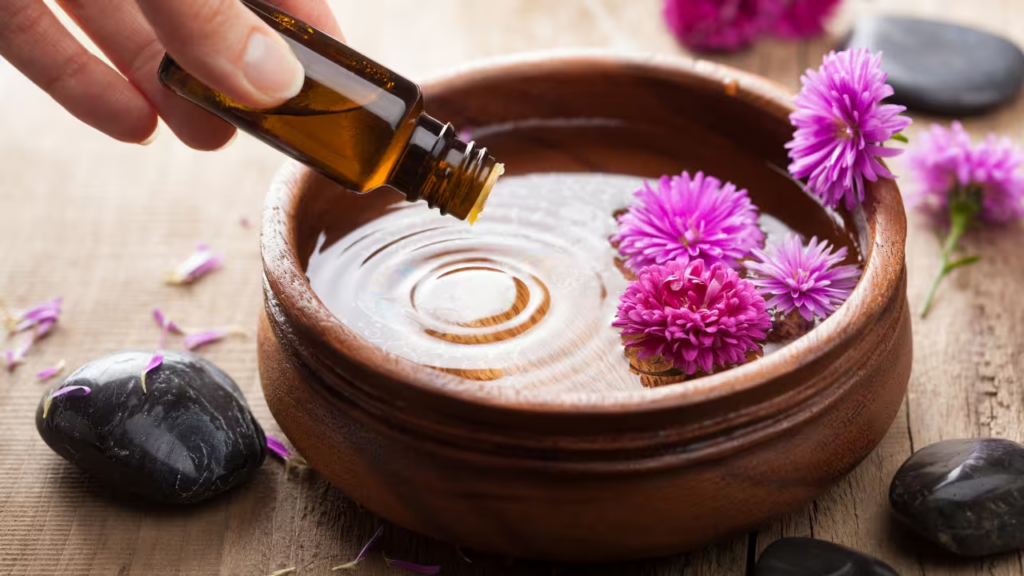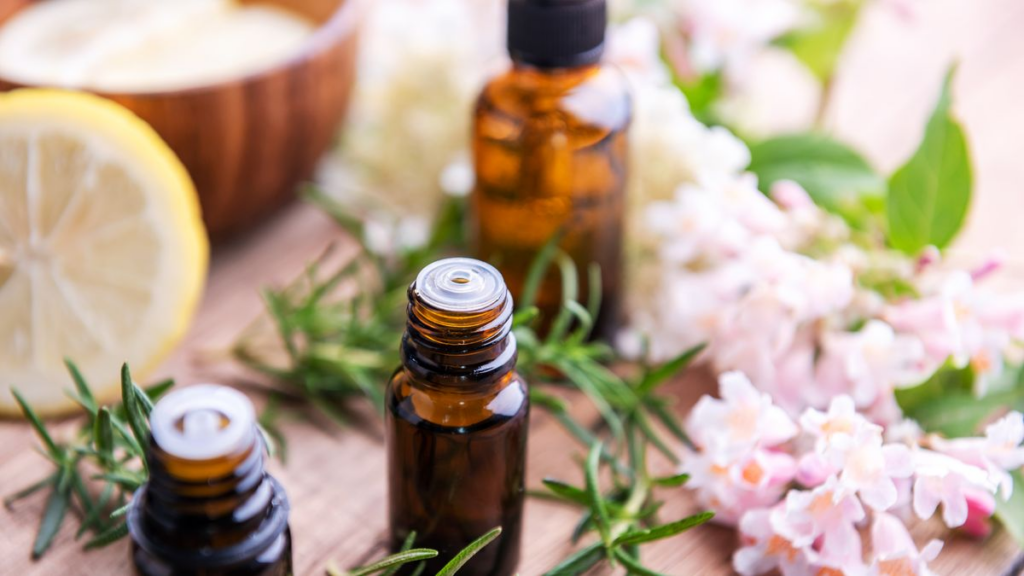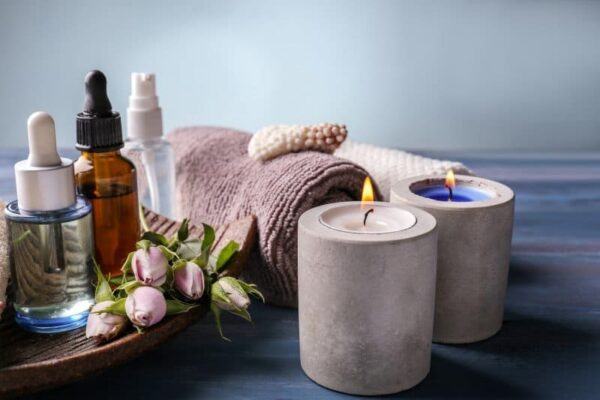
Life can be a buzz of activity, causing us to feel overwhelmed, exhausted, and in dire need of respite. That’s where aromatherapy comes in. Utilizing the healing power of natural aromatic extracts from plants, essential oils offer a soothing and rejuvenating method for rest and relaxation. This time around we are going to look into seven different types of essential oils that are famous for their ability to relieve stress and promote overall well-being.
What are the benefits of lavender essential oil?
The benefits of lavender essential oils are renowned for their calming effects, helping reduce anxiety and promote sleep. It also has antiseptic properties, aiding in wound healing and skin irritation relief. Its soothing aroma makes it popular for relaxation, and stress reduction, and as a sleep aid in aromatherapy practices.
Lavender is just versatile and, at the same time, often used during aromatherapy to bring about a feeling of peace and calmness. The antimicrobial effects of its properties help in treating minor burns, bites of insects, and irritations caused by skin problems.
Lavender can be said to even promote the quality of sleep by its diffusion before sleeping or application to pillows. It is widely used in personal care products since it has a smooth fragrance and is good for the skin. Its soothing odor, one that relieves stress and anxiety, is what makes it significant for holistic wellness practices.
How is tea tree essential oil used for health?
The tea tree essential oil is used for its antibacterial and antifungal properties in treating acne and skin infections. It can also act as a natural disinfectant. Known for its immunity-boosting properties, it is applied to skincare and cleaning products.
Tea tree oil is a very strong essential oil, which in most cases, can be used independently in a lot of natural remedies. The oil has some properties that are antibacterial; hence, it helps in the treatment of acne and reduces inflammation. Application on cuts or scrapped parts of the skin inhibits the process of infection. It’s a natural disinfectant, hence its use in many homemade cleaning solutions.
In addition to all these uses, tea tree oil can be diffused into the air to purify it and strengthen the immune system. This is a strong oil that can irritate if not properly diluted with a carrier oil, so use it with caution.

What are the therapeutic uses of eucalyptus essential oil?
Eucalyptus essential oil is commonly used for respiratory relief, helping alleviate symptoms of colds and congestion. Its anti-inflammatory properties aid in reducing muscle and joint pain. The invigorating scent also promotes mental clarity and alertness, making it a popular choice in aromatherapy and personal care products.
Eucalyptus oil is often used in inhalation therapies due to its properties for cleansing nasal passages and relieving breathing problems. It has anti-inflammatory properties, which are useful in massage oils to soothe straining muscles and joints.
A refreshing smell, eucalyptus oil is believed to rejuvenate the mind by enhancing concentration and focus. The oil is added to cough mixtures, throat lozenges, and salves for rubs on the chest, relieving cold discomfort. Its antibacterial properties make the oil useful in cleaning products and in personal hygiene items.
How can peppermint essential oil improve health?
Peppermint essential oil improves health with its cooling effect, providing relief from headaches and muscle pain. It aids digestion and reduces nausea. Its invigorating aroma helps enhance focus and energy. Commonly used in topical applications and inhalation, peppermint is versatile for both physical and mental well-being.
Massaging with this oil helps in combating headaches and migraines. It relieves muscle soreness and joint aches with its cooling effect. Peppermint oil acts as a digestive enzyme and helps reduce bloating, gas, and indigestion.
Its refreshing aroma enhances concentration and clearness of thought, making it very good for improving focus during work or study sessions. Moreover, peppermint oil revives the spirit and refreshes the senses as it is mixed into a diffuser. Since this oil irritates the skin, it has to be diluted with some carrier oil.
What are the benefits of lemon essential oil in aromatherapy?
Lemon essential oil is praised for its uplifting and cleansing properties. It boosts mood, reduces anxiety, and promotes concentration. Its antibacterial qualities make it useful in cleaning products. In aromatherapy, it’s used to invigorate and purify, providing a refreshing atmosphere that enhances mental clarity and energy.
Lemon oil is referred to as one of the most versatile essential oils. It displays its invigorating, bright, citrusy aroma, which uplifts one’s spirit and energizes the mind. It eases feelings of stress and anxiety while offering a cheerful mood.
Lemon oil is a booster of concentration and will always be useful in a workplace or study room. With its antibacterial properties, lemon oil makes for a great addition in any of your cleaning products. It also cleans the air, gives refreshing ambiance through diffusion. It is, therefore, phototoxic and should be applied to the skin with utmost care.

How is rosemary essential oil used for wellness?
Rosemary essential oil supports memory and concentration, making it popular for cognitive enhancement. Its anti-inflammatory properties aid in reducing muscle pain and improving circulation. Additionally, rosemary’s invigorating scent promotes mental alertness, and its antimicrobial benefits are used in hair care to promote scalp health and hair growth.
Rosemary oil is famous for improving cognitive functioning, which in turn gives improvement in memory. It often is used in aromatherapy to enhance focus and mental clarity. Rosemary oil is anti-inflammatory; as such, it relieves the pain of muscles and joints and improves circulation, thus providing relaxation.
In hair care, rosemary oil is believed to stimulate hair growth and reduce dandruff by promoting scalp health. It fights bacteria and fungi by possessing antimicrobial properties, hence giving this oil added value in soaps, lotions, and creams for personal care. Rosemary oil can be used by way of diffusion or topically by rubbing it onto the skin, but only when diluted.
What are the uses of chamomile essential oil?
Chamomile essential oil is used for its calming effects, helping reduce anxiety and promote sleep. Its anti-inflammatory properties soothe skin irritations and aid in digestive health. Chamomile’s gentle nature makes it ideal for use in skincare, relaxation therapies, and as a sleep aid for both adults and children.
Perhaps the primary application of chamomile oil is its involvement in inducing relaxation and improving the quality of sleep. It has a soothing aroma that eases the level of stress and anxiety, hence quite applicable for nighttime routines.
The anti-inflammatory and antioxidant properties of the oil make chamomile oil effective at soothing skin conditions such as eczema and dermatitis. It may also facilitate digestion by soothing the digestive tract, hence alleviating symptoms such as bloating and indigestion. Since it is so mild, chamomile oil can be used on children and is an excellent, safe home remedy for a multitude of issues.
Wrapping Up!
Essential oils have numerous applications when it comes to rest and revitalization. Whether you choose to relax in lavender’s gentle arms or bask in the earthly scents of cedarwood these extracts will undoubtedly promote overall health while fostering domestic tranquility. Remember to try different oils! Identify those that best resonate with your well-being and design an individualized aromatherapy plan that relaxes you like magic leaving behind pure rejuvenation at every level.
